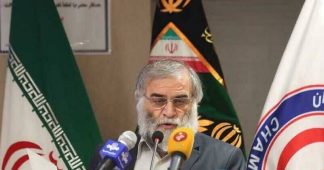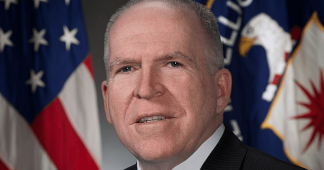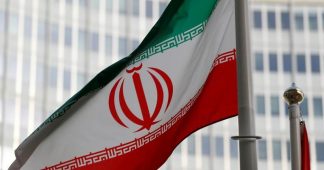The murder of an Iranian nuclear scientist presents a unique challenge to the president-elect.
By Jeet Heer
Nov. 30, 2020
On Friday, top Iranian nuclear scientist Mohsen Fakhrizadeh was shot and killed while travelling in northern Iran. No one has claimed responsibility for the killing, but both the Iranian government and many outside observers point to the likelihood of Israeli involvement, possibly with American assistance. As The New York Times reports, “One American official—along with two other intelligence officials—said that Israel was behind the attack on the scientist. It was unclear how much the United States may have known about the operation in advance, but the two nations are the closest of allies and have long shared intelligence regarding Iran.”
In a statement on Saturday, President Hassan Rouhani blamed Israel and vowed revenge. He also made an interesting aside that carried the implication that changes in American politics might be a factor. “This brutal assassination shows that our enemies are passing through anxious weeks, weeks that they feel their pressure era is coming to an end and the global conditions are changing,” Rouhani said. The “anxious weeks” could be a reference to the transition between Donald Trump and Joe Biden. If that’s so, “pressure era” is an allusion to the hostile policies of intensified sanctions and unconventional military attacks, known as “maximum pressure,” that have been carried out by President Trump and Secretary of State Mike Pompeo.
Biden has promised to reenter the Iran nuclear deal. It’s difficult not to see the assassination of Fakhrizadeh as part of a deliberate effort to make any rapprochement much more difficult. On November 17, more than a week before the murder, the Times reported, “President Trump, even as a lame duck, is moving quickly to increase American sanctions against Iran and sell advanced weapons to its regional enemies, policies that would be difficult for a new president to reverse. Last week, he asked his advisers for options to launch a military strike against Iran but appears to have been talked out of it. His aides argued that an attack could quickly lead to a larger war.” The assassination seems like a way to achieve some of the goals of the military strike that the military dissuaded Trump from launching.
Diplomat Dennis Ross, who served under both George H.W. Bush and Bill Clinton, argued against the idea that the killing was designed to scuttle Biden’s diplomacy, tweeting, “One can debate the logic of killing of Mohsen Fakhrizadeh. But to argue it was done to frustrate the incoming Biden Administration ignores reality. Such an operation takes extensive planning, having operatives on the ground, actionable intelligence. It can’t be spur of the moment.”
Ross isn’t very convincing. Of course, an assassination like this needs long planning. But the move from a preexisting plan to an actual operation can be made relatively rapidly. It strains credulity to maintain that Israeli Prime Minister Benjamin Netanyahu, a longtime opponent of the Iran nuclear deal, was not mindful of Biden’s victory.
Netanyahu can read a calendar, and he knew that the time to constrain Biden was running out. The final weeks of Trump’s administration are crucial not just for Netanyahu but also for other opponents of the Iran deal, including allies like Saudi Arabia. Ample reporting of high-level communication between the Trump White House and its counterparts in Israel and Saudi Arabia makes plausible the idea that there is a concerted effort to create a crisis that will sabotage Biden’s diplomacy before it even starts. Pompeo recently visited Israel, giving a thumbs up to West Bank settlements. Is it possible that trip was part of a hidden quid pro quo that includes the killing of Fakhrizadeh? Presidential son-in-law Jared Kushner is currently in the Middle East meeting Saudi leaders. Again, the timing of the visit raises questions about possible secret deals.
Biden now faces a real test. The assassination of Fakhrizadeh was quite likely not just a crime but also an attempt to humiliate Biden himself. The United States has only one president at a time, so Biden isn’t in a position to condemn the attack. Writing in the Times, Barbara Slavin, director of the Future of Iran Initiative at the Atlantic Council, noted that Biden and his team “cannot do much more than message through the media to Iran to stay patient until the inauguration on Jan. 20—and to the Israelis to stop their campaign of sabotage.”
So far, the strongest words on the attack have come from Trump critics who are far removed from being official voices of the incoming president. Former CIA director John O. Brennan tweeted, “This was a criminal act & highly reckless. It risks lethal retaliation & a new round of regional conflict. Iranian leaders would be wise to wait for the return of responsible American leadership on the global stage & to resist the urge to respond against perceived culprits.” Representative Ilhan Omar cited Brennan’s words and added, “Speaking out against violations of international law isn’t partisan issue, it’s also not being on the side of Iran. It’s about balance and not plunging the world into more chaotic state than we are already in.”
It’s impossible to imagine Biden being as forthright as Brennan or Omar. In fact, there’s evidence that Biden’s foreign policy team is actually retreating on its commitment to rejoin the nuclear deal. Speaking to the Times, Jake Sullivan, newly appointed to be Biden’s national security adviser, said the United States could return to the deal “if Iran returns to compliance, for its obligations that it has been violating, and is prepared to advance good-faith negotiations on these follow-on agreements.” The proviso that compliance would have to be augmented by new negotiations seems like a push for a harder line than Biden’s previous position. It’s not clear that Iran would accept this proviso.
David Sanger of The New York Times lays out a plausible scenario whereby the assassination ignites a new cycle of violence:
“Pressure is already mounting for some response—either a calculated one, presumably on the orders of the supreme leader, Ayatollah Ali Khamenei, or an unscripted lashing out, perhaps by a rogue element of the Iranian military or an Iranian-sponsored militia that does not get the memo to wait for Inauguration Day.
That may be exactly what Mr. Netanyahu—and Mr. Trump and his advisers—is betting on. Any retaliation could result in American military action, exactly what Mr. Trump contemplated, and was argued out of, two weeks ago when news came that Iran was continuing to produce nuclear fuel above the limits of the 2015 accord. (That move, of course, was in response to Mr. Trump’s decision in mid-2018 to break out of the agreement himself.)
If Sanger is right, then Biden’s first and most important task upon assuming office will be to defuse this crisis. To do so, he’ll have to move beyond the safe zone of simply reiterating a desire to resume the nuclear deal with Iran. Rather, Biden will have to make a bolder call condemning those who tried to sabotage his foreign policy. If the evidence points in that direction, this will include calling out Israel and possible accomplices like Saudi Arabia. This will be a hard task, but it is absolutely essential, and not just for the sake of Iran policy. If Biden is going to have any success as president, he has to show he’s willing to fight those who are trying to undermine him.”
Published at https://www.thenation.com/article/world/biden-assassination-iran-scientist/











